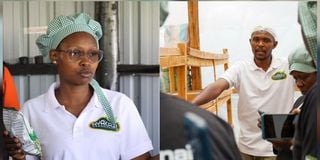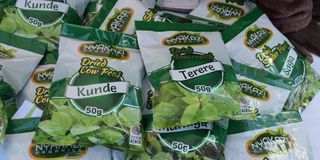Biz Lounge: Youth-led startup tackles food waste by drying veggies for the future

Mercy Manyange and Kelvin Kamau during a farmers training at Nyakazi work station in Gilgil.
Founded in 2023 by Kelvin Kamau and Mercy Manyange, Nyakazi Organics is a youth-led agribusiness on a mission to reduce food waste, improve nutrition, and empower smallholder farmers.
The business was born after realizing that nutritious indigenous vegetables like managu, sagaa, and terere were rotting in rural farms, and urban consumers struggled to access healthy, affordable food.
“We saw so much produce going to waste, especially in the smallholder farmers' farms, yet in the cities, people were hungry for the same vegetables. That contrast sparked the idea of what if we could preserve these vegetables and make them available year-round,” says Manyange.
As they engaged more with farmers, the duo recognized a major gap in preservation methods and market linkages for African indigenous vegetables (AIVs).
“Traditional vegetables were being undervalued and often left to rot because there was no reliable market or storage method. Meanwhile, people in Nairobi or Mombasa were looking for more natural and healthy food options,” explains Kamau.
Kamau says that they chose solar dehydration as their preservation method both for its practicality and sustainability.
He adds that the journey from idea to launch wasn’t easy and one of their earliest hurdles was limited startup capital.

Sample of the dried vegetables from Nyakazi Organics.
“We approached several bigger players in the field, but none were willing to open their doors and share insights,” says Kamau.
Fortunately, Seed Savers Network offered incubation support, mentorship, and product development guidance.
“They believed in our idea when it was still on paper. They helped us with everything from prototyping to business registration,” Kamau recalls.
He says they started with just Sh. 500,000 a combination of Sh. 300,000 from their savings and a loan of Sh. 200,000.
Nyakazi now works directly with smallholder farmers from Nakuru, Vihiga, and Kakamega counties who practice agroecology.
Manyange says the dehydration process follows a structured method to retain nutritional value including weighing, sorting, thorough washing, blanching, drying, and careful packaging.
Nyakazi’s customer base includes urban professionals, health-conscious consumers, and Kenyans in the diaspora. They sell the dried vegetables from Sh. 200 a packet.
Although their primary focus is dried produce, Nyakazi also supplies fresh vegetables on request, striking a balance to meet different customer needs.
Kamau notes that the business also prioritizes youth empowerment, highlighting that Nyakazi has employed two youth full-time, engaged 15 part-time workers, and collaborated with 133 farmers so far.
“We give young people opportunities to not only earn a living, but also engage in dialogues around sustainable agriculture,” says Kamau.
Manyange says that quality control is overseen both internally and in the field. Their operations lead ensures hygiene and standards during processing, while Seed Savers extension officers monitor farms to ensure agroecological practices are followed.
She says that looking ahead, they are seeking to sell their products on shelves across East Africa and beyond, noting they aim to double revenue, attract investment, and diversify their product range.
For aspiring agripreneurs, they advise “Don’t dismiss your small ideas. Start small, seek advice, attend forums, research—and above all, be open to learning.”


